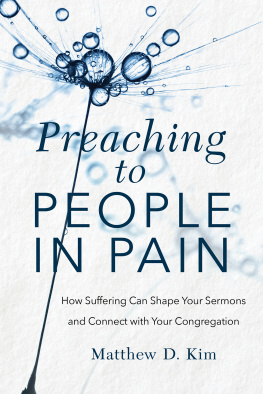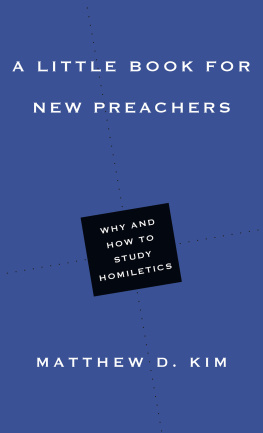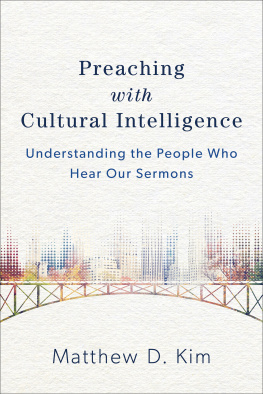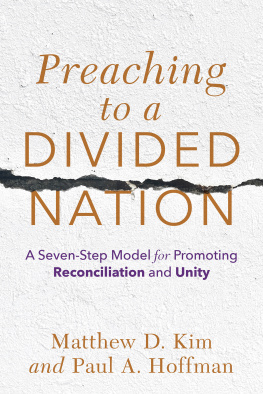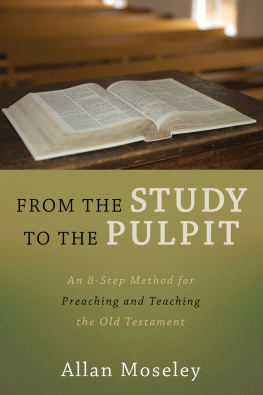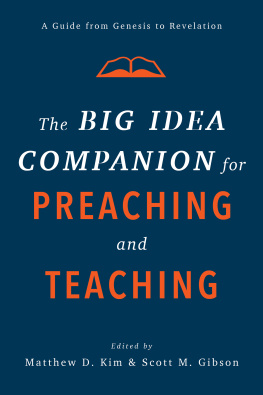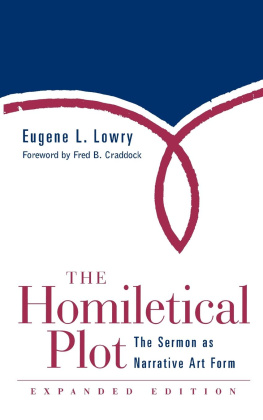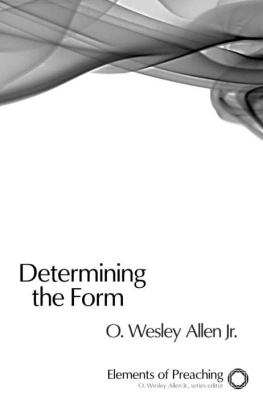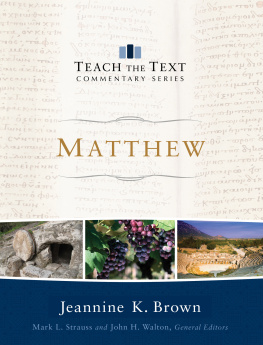Matthew
O. Wesley Allen Jr.
Fortress Press
Minneapolis
Contents
MATTHEW
Fortress Biblical Preaching Commentaries
Copyright 2013 Fortress Press. All rights reserved. Except for brief quotations in critical articles or reviews, no part of this book may be reproduced in any manner without prior written permission from the publisher. Visit http://www.augsburgfortress.org/copyrights/ or write to Permissions, Augsburg Fortress, Box 1209, Minneapolis, MN 55440.
Scripture quotations are from the New Revised Standard Version Bible, copyright 1989 by the Division of Christian Education of the National Council of the Churches of Christ in the USA. Used by permission. All rights reserved.
Library of Congress Cataloging-in-Publication Data is available
Print ISBN: 978-0-8006-9871-3
eBook ISBN: 978-1-4514-2645-8
The paper used in this publication meets the minimum requirements of American National Standard for Information SciencesPermanence of Paper for Printed Library Materials, ANSI Z329.48-1984.
Manufactured in the U.S.A.
This book was produced using PressBooks.com.
For
Howard Collins,
Stewart Jackson,
Rex Kaney,
Bill Kincaid
and Ron Luckey.
Some of the best of those
who have preached to me over the years.
All of whom make me want
to be a better preacher in the years to come.
A preacher who seeks to be creative, exegetically up to date, hermeneutically alert, theologically responsible, and in-touch with the moment is always on the hunt for fresh resources. Traditional books on preaching a book of the Bible often look at broad themes of the text with little explicit advice about preaching individual passages. Lectionary resources often offer exegetical and homiletical insights about a pericope with little attention given to broader themes and structures of the book from which the lection is taken. Fortress Biblical Preaching Commentaries provide the preacher with resources that draw together the strengths of these two approaches into a single text aid, useful for the moment of preparation halfway between full scale exegesis and a finished sermon.
The authors of this series are biblical scholars who offer expositions of the text rooted in detailed study and expressed in straightforward, readable ways. The commentators take a practical approach by identifying (1) what the text invited people in the ancient world to believe about God and the world and (2) what the text encouraged people to do in response. Along the way, the interpreters make use of such things as historical and cultural reconstruction, literary and rhetorical analysis, word studies, and other methods that help us recover how a text was intended to function in antiquity. At the same time, the commentaries offer help in moving from then to now, from what a text meant (in the past) to what a text means (in the present), by helping a minister identify issues, raise questions, and pose possibilities for preaching while stopping short of placing a complete sermon in the preachers hands. The preacher, then, should be in a position to set in motion a conversation with the text (and other voices from the past and present) to help the congregation figure out what we today can believe and do.
The commentators in this series seek to help preachers and students make connections between the various lections from a given book throughout the lectionary cycle and liturgical year in their sermons and studies. Readers, preachers, and their parishioners will have a deeper appreciation of the books unique interpretation of the Christ event and how that influences their approach to living the Christian faith in todays world. The most life-giving preaching is nearly always local in character with a minister rooted in a particular congregation, culture, and context encouraging listeners to think specifically about how the text might relate to the life of the congregation and to the surrounding community and world. Fortress Biblical Preaching Commentaries are set forth in the hope that each volume will be a provocative voice in such conversations.
Preface
Preaching Matthew is a hybrid of sorts, combining material usually found in different types of biblical, homiletical, and liturgical resources. From traditional books focused on helping pastors preach consistently through a biblical work, it keeps its eye on the overarching structures, themes, and theological claims that give Matthew its unique character. From commentaries that work passage by passage through a biblical work, it works through Matthews material in the order Matthew presents it. But from homiletical helps for lectionary preachers, it gives most attention to readings from Matthew (lections) that appear in the Revised Common Lectionary (RCL). In this combination of approaches, preachers long familiar with Matthew may see elements of the First Gospel in a new light and may lead a congregation to experience the liturgical year based on Matthew (Year A in the RCL) in a new way.
This hybrid approach grows out of my understanding of the nature of biblical preaching. To preach biblically does not mean to go to the Bible, discover what it says, and simply repeat or translate it for a contemporary audience. Instead, the focus of biblical preaching (well, of any Christian preaching) is the good news of Jesus Christthe grace, judgment, and call of God-with-us, here and now, as God has always been with the world. In the sermon, a biblical passage serves as the particular lens for the day for seeing a particular way God is with us and what it means for life in the world corporately as the body of Christ and individually as a disciple of Christ. In sermon preparation (and in the sermon itself), therefore, preachers should focus their gaze less on the text and more through it to look at life there and find the God made known in the Christ event in new and enlivening ways.
This type of focus changes the way preachers read a biblical text on behalf of a congregation. Critical exegesis is as important as ever, but it is a means to an end. Exegesis during sermon preparation is the process of turning the lens to sharpen the preachers focus on the theological, ethical, pastoral, and existential needs of the congregation. Thus this book is exegetical in nature, but it is unapologetically exegesis in service to the pulpit. It does not attempt to be exhaustive in dealing with textual, historical, or literary issues involved in studying Matthew. It does not position the interpretation of different elements of Matthew in either the history of interpretation or among contemporary scholarship. While the nature of this approach means I have avoided the use of footnotes or references to scholarship, I hope the conversation I have had with Matthean scholarship and my dependence on the research of others is evident in the work. For a list of helpful research and important commentaries on the book of Matthew, an appendix indicating sources for further reading has been included.
So I have been selective in what I have included in this book, assuming that preachers who turn to it will (1) already be familiar with general issues related to Matthean scholarship from seminary or other biblical studies and (2) have done significant exegesis on a passage of interest using critical commentaries based in historical and literary criticism, Bible dictionaries, and other resources before turning to my discussion of that text. In other words, this homiletical, lectionary-oriented commentary on Matthew is meant to help preachers as they begin to turn from detailed, critical commentaries toward the pulpit. Preachers have not moved so close to the sermon that they are looking for sermon imagery and the like but close enough that synthesis of exegetical findings and theological possibilities is needed. In other words, while this book is not intended as a resource that fits the needs of preachers closely examining a biblical text for the first time in their sermon preparation, neither is it a resource for the final stages of sermon preparation where they are filling out their reading of a text with the stuff of the congregation. It stands in the middle of the week of the preparation, just at that point where the preacher is beginning to let go of reading the text for its own sake and moving toward interpreting it for the sake of a specific congregation set in a specific historical time and place.


